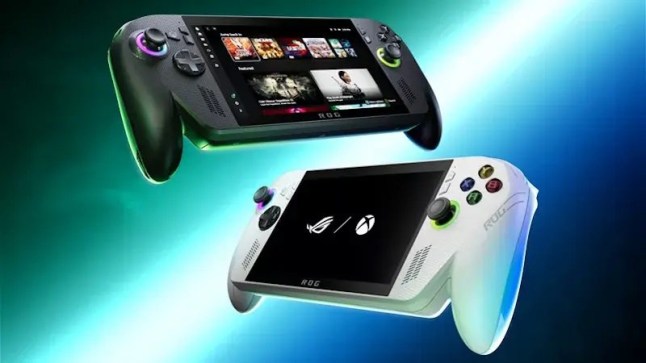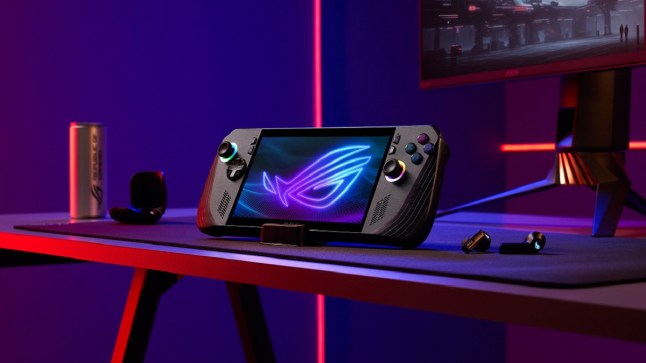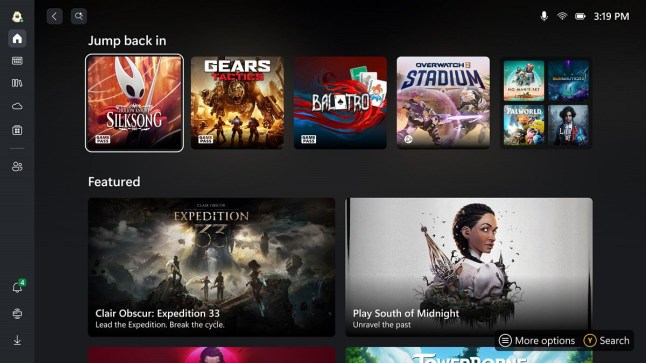
If you’ve yet to invest in a handheld PC, GameCentral takes a look at the new Xbox portable and what advantages it has over its rivals.
After months of teasing, and rumblings of a dedicated Xbox handheld device, Microsoft finally unveiled two new devices during the Xbox Games Showcase this weekend.
As was rumoured, these devices come not from Microsoft itself but Asus which is already responsible for its own Asus ROG Ally handheld PC. Which is why these devices are dubbed the ROG Xbox Ally and ROG Xbox Ally X.
With Microsoft still working on a separate portable device (which rumours say has been delayed internally), these Asus products will be the next best thing for those who want to enjoy Xbox games on the go.
Despite what you might imagine, the portable PC market is incredibly niche in the grand scheme of things, with sales that pale compared to eventhe Xbox Series X/S. That’s primarily because of the price but also the complexity involved in getting PC games to work on a portable.
While it’ll be a while before anyone can go hands on with the new devices (they’re slated to launch sometime this Christmas), Microsoft has already shared details on the ROG Xbox Ally – including technical specs – meaning we can compare and contrast with the most popular PC handhelds already on the market.
ROG Xbox Ally vs. Asus ROG Ally
Expert, exclusive gaming analysis
Sign up to the GameCentral newsletter for a unique take on the week in gaming, alongside the latest reviews and more. Delivered to your inbox every Saturday morning.

First things first, is the ROG Xbox Ally any better than the Asus ROG Ally that you can already buy? Not particularly, no, but that’s unsurprising when it’s essentially the same device but with Xbox branding.
It technically has a different processor – the AMD Ryzen Z2 A Processor – but from what we can tell, it doesn’t sound that much more powerful than the Asus ROG Ally’s AMD Ryzen Z1 Extreme Processor. Both devices also have the same 16GB of RAM and 512GB of storage space for games.
That said, the Xbox handheld does sport better battery capacity, since it comes with a 60Wh (watt hours) battery compared to the Asus ROG Ally’s 40Wh battery.
It’s also notably bigger and heavier (670g compared to 608g), which might be due to it sporting contoured grips akin to the Xbox controller. We’d need to hold it ourselves to tell but, theoretically, this should make it more comfortable to use than the blockier looking Asus ROG Ally.
So far, it seems the only reason to pick a ROG Xbox Ally over the current one is to more easily access your library of Xbox games, with the new device featuring a lot more setting and features to facilitate that.
Xbox is promising first-of-their-kind features for the handheld, including ‘an immersive Xbox full screen experience [and] an aggregated gaming library with access to installed games from leading PC storefronts.’
As for the ROG Xbox Ally X, it’s also similarbut a more powerful iteration that uses an AMD Ryzen AI Z2 Extreme Processor. This comes along with more storage space (1TB) and a stronger battery (80Wh), though it’s also larger and heavier at 715g.
This makes it almost identical to the existing Asus ROG Ally X, which boasts the same storage space and battery and is itself just a stronger version of the Asus ROG Ally.
While Microsoft hasn’t shared official prices, its two Xbox devices will cost more or less the same as the currently available Asus ones. The Asus ROG Ally costs £599, in the UK, while the Asus ROG Ally X costs £799, although both have options for bigger and more expensive storage.
ROG Xbox Ally vs Lenovo Legion Go
Moving onto the first non-Asus competitor, the differences between the Lenovo Legion Go and the Xbox handheld appear small as well. The Lenovo Legion Go also uses the AMD Ryzen Z1 for its processor, both devices run on Windows 11, and they both have 512GB of storage that can be upgraded.
The Lenovo Legion Go does have less battery capacity at 49.2Wh, but it’s lighter at 640g and while it lacks the contoured grips of the ROG Xbox Ally, its controllers can detach like the Nintendo Switch’s Joy-Cons.
In fact, one advantage the Lenovo Legion Go has is its variety of play options. It has a dedicated mode for first person shooter games (albeit one that requires a controller base that’s sold separately) and can be docked so you can play it through a PC monitor or TV. Although considering existing Asus handhelds can be connected to the TV, we have to assume the Xbox ones will too.
There is AR functionality on the Legion Go through the Legion Glasses device but that’s too niche to be considered a drastic advantage over Xbox.
It’s also very easy to get Xbox Game Pass set up on the Legion Go – in fact, the app comes pre-installed – so it’s not like the Xbox handheld is the only way of accessing Game Pass titles on a portable.
However, the Legion Go is the more expensive of the two options, and goes for £699. There is a cheaper version called the Legion Go S, that’s sold at £600 though, which honestly looks more comfortable to use thanks to its curved design, but it is less powerful and has less storage space.
ROG Xbox Ally vs. Steam Deck
The Steam Deck is undoubtedly the most popular portable PC on the market (although it’s still only sold around 4 million units worldwide), so will the ROG Xbox Ally offer any significant competition? Upon comparing the two, probably not.
Not only is neither device more powerful than the other, since they use very similar processors, but they’re roughly the same size and weight as well. The most noteworthy differences we can spot is that the Steam Deck has a weaker battery (40Wh) and less storage space (256GB).
However, this makes the Steam Deck cheaper, at £349, and while there is an iteration of the Steam Deck with a better battery, that matches the ROG Xbox Ally’s 512GB of storage, it’s still significantly cheaper at £479. Even the Steam Deck with 1TB of storage space costs less at £569.
One downside is that Xbox Game Pass is fiddly to set up on Steam Deck and with Microsoft promising that its handheld will allow for ‘quick access to games from Xbox, Game Pass, Battle.net, and other leading PC storefronts,’ it sounds like you’ll be able to easily access the Steam storefront and purchase and play games through Valve’s launcher.
Is the ROG Xbox Ally worth it?
All in all, it seems the only real advantage for owning the ROG Xbox Ally is convenience. There’s a chance it will be more comfortable to hold during play sessions than its competitors, but it appears no more powerful than other portable PCs.
The aggregated Xbox library feature should be useful but the Xbox Play Anywhere system is, by its nature, available on many other devices.
The real deciding factor will be whatever price Microsoft settles on. Like we said, the Asus ROG Ally and Asus ROG Ally X are £599 and £799 respectively, making the Steam Deck a far more enticing option for anyone still on the fence about joining the portable PC community.
It’s not impossible that Microsoft will aim for a slightly lower price point and absorb some of the cost, but we doubt it since the ROG Xbox Ally isn’t technically Microsoft’s own hardware and that may undermine the other Asus handhelds being sold.

Email gamecentral@metro.co.uk, leave a comment below, follow us on Twitter.
To submit Inbox letters and Reader’s Features more easily, without the need to send an email, just use our Submit Stuff page here.
For more stories like this, check our Gaming page.







